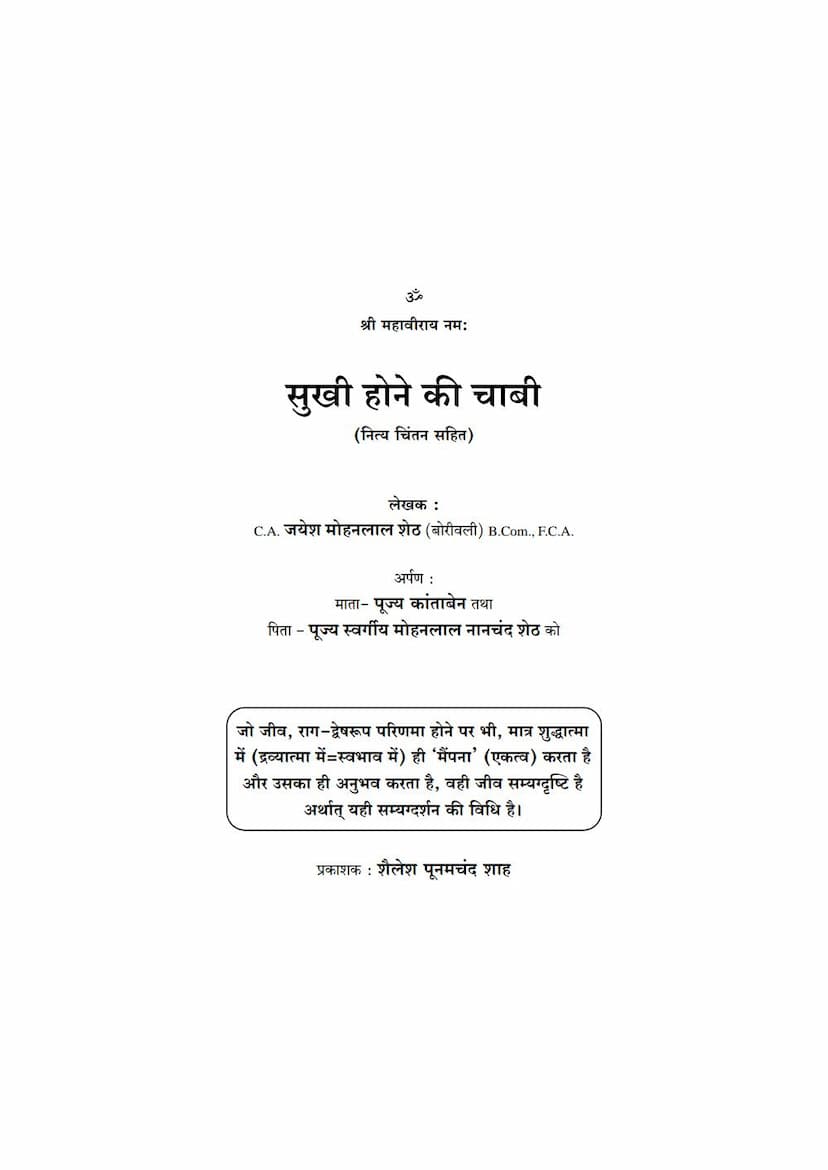Sukhi Hone Ki Chabi
Added to library: September 2, 2025

Summary
Here's a comprehensive summary of the Jain text "Sukhi Hone ki Chabi" (The Key to Being Happy) by Jayesh Mohanlal Sheth, based on the provided catalog link and text:
The book, "Sukhi Hone ki Chabi" (The Key to Being Happy) by Jayesh Mohanlal Sheth, published by Shailesh Punamchand Shah, is a profound guide rooted in Jain philosophy, aiming to lead individuals towards true and lasting happiness. The author, a Chartered Accountant by profession, distills years of study, contemplation, and practical experience into simple and accessible language, making the path to spiritual well-being understandable for the common person.
Core Philosophy and Aim:
The central theme of the book is that true happiness (Anand) is an inherent quality of the soul (Atma) and is achieved through Samagdarsan (Right Faith/Vision), which is the gateway to Moksha (Liberation). The book argues that while external pleasures and worldly possessions offer temporary satisfaction, they are ultimately transient and lead to suffering. The ultimate goal is to transcend the cycle of birth and death (Samsara) and attain the eternal, unblemished bliss of the soul.
Key Concepts and Guidance:
-
Two Types of Happiness: The book distinguishes between:
- Physical/Sensory Happiness: Derived from worldly possessions, health, family, and external comforts. This is described as temporary, fleeting, and ultimately a source of pain and desire.
- Spiritual/Inner Happiness: The eternal bliss of the soul, which is achieved through self-realization and detachment from worldly affairs.
-
The Importance of Samagdarsan: The author emphasizes that Samagdarsan is the "key" to true happiness and liberation. It is the correct understanding and faith in the true nature of reality, particularly the self (Atma) and the non-self (Pudgal). Without Samagdarsan, even extensive religious practices are considered futile.
- Nishchay Samagdarsan (Actual Samagdarsan): This is the direct experience and realization of the soul's true nature, free from delusions and attachment.
- Vyavahar Samagdarsan (Conventional Samagdarsan): This refers to faith in the correct teachings of the Tirthankaras, deities, and gurus, which is a preliminary step towards Nishchay Samagdarsan.
-
The True Nature of the Soul (Atma): The book explains that the soul is inherently pure, omniscient, and blissful (Sat-Chit-Anand). Its true state is like that of a Siddha (liberated soul). The suffering experienced in the world is due to the soul's entanglement with karmas and its identification with the physical body and its attachments (mithyatva).
-
Understanding Karma and its Impact: The book touches upon the principle of karma, stating that all experiences, whether happiness or sorrow, are the result of past actions. It stresses that:
- Blame Others, Blame Yourself: When facing suffering, it's crucial to recognize that the cause lies in one's own past deeds, not in external circumstances or individuals. Seeing others as mere instruments (nimitta) is vital to avoid further karmic bondage.
- The Power of Intention (Anubandh): The author highlights that the underlying intention and mental state (anubandh) at the time of performing an action significantly influence the karmic outcome.
-
Practices for Spiritual Progress: The book outlines several practical guidelines and contemplations:
- Daily Routine: Waking up before sunrise, reciting the Namaskar Mantra, and performing introspection (Pratikraman).
- Pratikraman (Introspection/Confession): A crucial practice for acknowledging and repenting past transgressions committed through mind, speech, and body. This is presented in a detailed, step-by-step manner.
- Avoiding Sinful Practices: The text strongly advises against activities like consuming root vegetables (Kandmool), night meals, gambling, intoxication, meat-eating, theft, adultery, and dishonest earnings. These are considered major sins that create new suffering.
- The Twelve Bhavanas (Contemplations): The book encourages contemplation on the twelve reflections (Anitya, Asharan, Sansar, Ekattva, Anyattva, Ashuchi, Asrav, Samvar, Nirjara, Lokaswaroop, Bodhi Durlabh, Dharma) to cultivate detachment and spiritual understanding.
- Meditation (Dhyan): While emphasizing that Samagdarsan is primarily attained through knowledge and discrimination, the book also discusses meditation as a tool for mind control. It differentiates between unhealthy meditations (Artadhyan, Raudradhyan) and spiritual meditations (Dharmadhyan, Shukladhyan).
- Mind Control: The mind is identified as the most powerful instrument, responsible for both bondage and liberation. Controlling the mind's focus is paramount.
- Detachment (Vairagya): Cultivating detachment from worldly pleasures, possessions, and relationships is essential for spiritual progress.
- Self-Reflection: Regularly questioning what one truly likes or is attracted to serves as a barometer for one's spiritual progress and devotion.
-
Specific Teachings:
- Kandmool (Root Vegetables): The book details the immense sin associated with consuming root vegetables due to the presence of countless microscopic souls (Anantanant Jiva) within them.
- Night Meals: The practice of abstaining from food after sunset is advocated for both spiritual and scientific reasons, highlighting its benefits for health and detoxification.
- Samadhi Maran (Peaceful Death): True Samadhi Maran is achieved by living a life of Samagdarsan and detachment. The book clarifies that death is the separation of the soul from the body, and sorrow arises from attachment. Preparation for a peaceful death involves living a life of righteousness and detachment.
The "Key" to Happiness:
The book posits that the "key" is not merely performing rituals or following external practices, but achieving Nishchay Samagdarsan – the direct realization of the soul's true nature. All other practices, while beneficial, are steps or aids towards this ultimate goal. The author stresses that this transformation is possible for anyone, regardless of their current circumstances, through sincere effort and correct understanding.
Overall Message:
"Sukhi Hone ki Chabi" is a call to introspection and self-transformation. It guides readers to shift their focus from fleeting external pleasures to the eternal bliss of the soul. By understanding the principles of karma, cultivating detachment, practicing self-discipline, and ultimately realizing the true nature of the self through Samagdarsan, individuals can break free from the cycle of suffering and attain lasting happiness, which is the ultimate state of Moksha. The book encourages readers to apply these teachings diligently in their daily lives for spiritual upliftment.